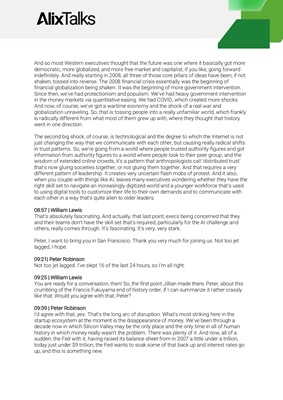
07:13 | William Lewis
Ok, so, Wendy, I want to bring you in here. So, volume, speed, coordination, all adding up to an
unprecedented situation. Would you agree with that?
07:24 | Wendy Wysong
I would, but I think one of the things Tom said that everybody really has to keep in mind, that
these are very complicated, they're very expansive, but they're not comprehensive. And that in
some ways makes things a little bit easier in the sense that there is still business to be done.
But on the other hand, because it's so surgical and because they're so widespread across a
number of different industry sectors, a lot of different companies, it also makes it more
complicated and more difficult to make sure that you're in compliance. It's not Iran, it's not
North Korea, it's not Syria, not Cuba, not even the DNR or the LNR of Ukraine. I mean, this is
something that we have to pay very, very close attention. And as you say, it's been these
waves of sanctions, and even sometimes it'd just be one sanction a day for a while, and then
all of a sudden you get another big wave. So, it's something everybody has to pay attention to.
It's not as easy as just completely blanking a country out.
08:36 | William Lewis
Ok, all right, so unprecedented. And Guy, also fair to say, a very fast-moving situation. And just
in the last hour, we've got news of a new set of sanctions, including against Putin's two, or two
of Putin's daughters. Can you just tell us a bit about that? Were you surprised by that? And can
you give us your broader analysis as one of the industry's leading participants? What does this
mean at this stage?
09:09 | Guy Harrison
Yeah, let me come on to the new sanctions in just a second. But I just want to add something
to what Tom and Wendy were saying in terms of this being unprecedented. I think one of the
things that's really stood out for me is that certainly companies in the West are not just
looking to comply with the letter of the law, but they're actually moving ahead of regulation.
And I think that's been something that we haven't really seen before. Companies not just
doing what's legal, but arguably what's right as well, and withdrawing their own services from
Russia ahead of the sanctions.
I think also, in addition to that, when we've seen these types of sanctions being imposed
previously, a lot of the conversations have been about what's Credit Suisse doing, what's
Standard Chartered is doing, the big banks. A lot of the narrative this time has been around
the enablers. So, I'm thinking of accountants, lawyers, estate agents, other people, as well as
big corporates multinationals, not just the financial services industry. So, I think those are two
things that really stood out for me in terms of what's been unprecedented.
Coming on to what's been happening this afternoon, I think four big changes, and still
catching up with the detail - as you said, it's incredibly fast moving, Will, and something very
difficult for companies to address. But firstly, no new investment - these are U.S. moves by
the way - no new investment into Russia. Secondly, further sanctions against the largest
private bank, Alfa Bank, and the largest financial institution in Russia, SberBank. You're also
seeing other major state-owned companies getting further sanctions against them. And then
finally, something that's great for grabbing headlines, although we can debate the
effectiveness of it, certain individuals closely associated with Putin, and in particular his two
daughters, and then also the family of Sergei Lavrov, as well.